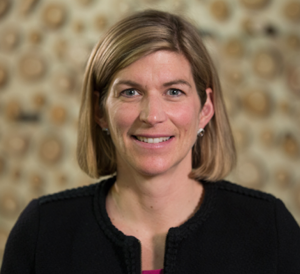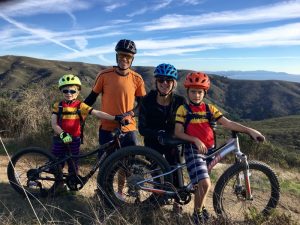We want to give you a glimpse into the extraordinary talent and expertise of those who serve our school on the board of trustees. Much of their work is done behind the scenes and is critically important to our ability to build a strong foundation for the future. One of those individuals is Letitia Webster, a mother of two young boys who attend our school and a top executive leading the enterprise-wide sustainability & responsibility program for one of the nation’s largest apparel and footwear companies, VF Corporation.
Letitia and her family relocated to Greensboro from the San Francisco Bay area in 2011 when she accepted the position as Global Vice President of Corporate Sustainability for VF Corporation. As leader of VF Corporation’s Sustainability & Responsibility (S&R) program, Letitia is responsible for creating top-line value through innovative business solutions that reduce the environmental footprint and improve the social impact of the business. Her focus includes using the scale and influence of the company around the world to make transformational change within the apparel and footwear industries.
Prior to that she had ten years of experience as the Brand Manager and Director of Strategic Marketing and Communications for The North Face, one of VF Corp’s most visible brands. While at The North Face, she managed the sports marketing program which produced The North Face Endurance event and a six part TV series entitled Never Stop Exploring. Webster launched The North Face sustainability program in 2006, leading the adoption of bluesign (a system for sustainable textile production), membership with Business for Innovation, Climate and Energy Policy (BICEP) and the Outdoor Industry Association's Eco-Index. Additionally, one of her accomplishments was the development of an Outdoor Participation program and team to encourage, inspire and enable people to get outside and start a lifetime of passion for the outdoors.
Since her early days at VF Corp she has been paving the way for more sustainable business development for the company. Letitia is driving a number of initiatives including: launching VF’s updated S&R strategy, Made for Change, releasing the company’s new S&R GRI progress report, reporting to the Carbon Disclosure Project (CDP) on VF’s carbon, water and forestry footprint, supporting fourteen Zero-Waste Distribution Centers and six LEED certified facilities, including LEED platinum world headquarters for the VF Outdoor Coalition, VF’s EMEA headquarters and the brand new Vans® brand headquarters in Costa Mesa, CA. She sets enterprise-wide global goals including a five year goal to reduce VF’s global carbon footprint by 5%, and exceeded it by achieving a 12.5% reduction. With her leadership, VF has committed to 100% renewable energy by 2025 for all owned and operated facilities and works to advocate for strong climate change policy at the local, national and international level. She attended and presented at the Paris Climate Conference (COP21) in 2015 with governmental and corporate leaders from over 150 countries. She works closely with VF’s 30+ brand portfolio leaders to integrate sustainability into their brand strategies to create engaging ways to connect their products and programs with their core consumers.
Click here to view an interview with Letitia and her colleague, Stewart Whitney of Timberland, at the 2016 GreenBiz Forum in Phoenix, Arizona sharing their experiences in driving and integrating corporate-level sustainability programs. In honor of her commitment and dedication to advancing systems that support sustainability on a global scale, Letitia was honored on International Women’s Day in March of 2016 by the organization known as Ceres that works with the most influential investors and companies to build leadership and drive solutions to tackle the world’s biggest sustainability challenges. Click here to read more about Letitia’s recognition on International Women’s Day. To say that we are fortunate to have her vision and leadership at GMS as we work toward a greener future is an understatement.
Webster holds a bachelor's degree in Business and Environmental Policy from Bowling Green State University and a master’s degree from Bainbridge Graduate Institute, a Washington-based institution that became the first to offer an M.B.A. in Sustainability and Change Management. In her previous life she was a Professional Ski Instructor, River Raft Guide and Kayak Instructor and the Executive Director of Telluride, Colorado’s local conservation group, Sheep Mountain Alliance. She served as a board member for various organizations, including Sheep Mountain Alliance and Telluride MountainFilm Festival and currently serves on the board of Communities in School of Greater Greensboro,which provides a network of support, services and adult mentors for young people facing adversity empowering them to stay in school. Also, as part of her roles at The North Face and VF, Webster spearheaded the development of the Sustainable Apparel Coalition and founded the Conservation Alliances’ Legacy Fund.
Letitia has shared with us that their family was drawn to Montessori education for their children because of our emphasis on environmental education, outdoor learning and innovative thinking. From her view as an industry executive, she said "We are seeing across the board in the corporate world that innovation is incredibly important. We need people who are diverse thinkers, who are creative thinkers, and who have a hunger to learn and to challenge the status quo. That is incredibly important as we think about being competitive in the world today and when I look at Montessori I think that this is a perfect primer."
Given her passion for sustainability and preservation of the environment, it should not come as a surprise that Letitia and her husband, Jason, are both outdoor enthusiasts and enjoy all manner of off-the-grid activities with their boys, Jack and Quinn, now ages seven and five. On any given weekend, you might run into them hiking or biking on the network of trails around the Triad, or headed to the mountains for a camping trip or a downhill skiing adventure.
"The willingness to show up changes us. It makes us a little braver each time." - Brené Brown
I think Brené Brown and Maria Montessori would be fast friends, had they lived during the same time. They both believe deeply in showing up as who we are … and in following that authentic self. Montessori calls it following the child; Brown calls it being authentic and vulnerable in order to find wholehearted living. It’s important to say that the concept of “vulnerability” has evolved into a positive and beneficial behavior and characteristic in both Brown’s and my research.
Montessori wrote that “the child is capable of developing and giving us tangible proof of the possibility of a better humanity. We have seen children totally change as they acquire a love for things and ideas and as their sense of order, discipline, and self-control develops within them.... The child is both a hope and a promise for all humankind.” A hope and promise for humankind starts at the center of the child’s ability and gift to show up as who they are. If this concept interests you, I thought I’d walk you down a path of Brown’s research, and why I think it ultimately connects to our work at GMS.
Brown began her research journey in the field of social work with her basic belief about the necessity of human connection. “Connection is why we’re here; it is what gives purpose and meaning to our lives” (Brown, 2012a, p. 253). Her dissertation explored assessing relevance in professional helping (e.g., pastoral care, psychologists, educators, or organizational leaders). Over six years, she interviewed 1,280 professionals to develop her theory of accompaniment.
Through asking her participants about human connection, she ended up developing the related ideas of shame and shame resilience. Asked about human connection, participants invariably ended up talking about instances of heartbreak, betrayal, and shame, which Brown defined and coded as the fear of not being worthy of real connection. That emerging pattern led her to return to her data to investigate why and how some were resilient to this shame, heartbreak, and betrayal. She eventually developed a model of shame and shame resiliency, which revolved around empathy, courage, compassion, and connection. The patterns in her data pointed to wholeheartedness, which Brown developed into what she called wholehearted living. And from her study of wholehearted living, Brown then focused her research attention on the power of vulnerability. Vulnerability and having the courage to show up authentically and humbly as who we are connects to how we ask our students at GMS to show up. Brown (2012a) wrote, “Vulnerability is the core, the heart, the center, of meaningful human experiences” (p. 12). Vulnerability (being open, authentic, and humble) directly connects to a person’s ability to honestly know their self and their limitations.
Here is where we begin to connect more to the work we do at Greensboro Montessori School. We believe, just as Maria Montessori, that we are always striving for meaningful human experiences and lessons. To achieve this, we need to empower our students to think independently, critically, and openly. And that takes courage.
To be comfortable with their personal vulnerability, Brown writes that people must first have a strong sense of love and belonging. We work to instill that belonging everyday in all our classes. That sense of worthiness is a foundational path for students to find greatness. Conversely, when people cannot be real and honest, i.e. vulnerable, they block great ideas and innovation. Brown (2012a) identifies a lack of vulnerability as the “most significant barrier to creativity and innovation” (p. 187). This lack of vulnerability fosters a fear of change and close-mindedness. If we cannot empower our students to take safe risks and to see the value of struggle and failure, then we may be stinting their ultimate growth.
It takes courage and bravery for students to have new ideas and try new things. Entrepreneurship, growth, and new ideas cannot thrive in an environment that does not welcome openness and authenticity. One participant in an interview with Brown (2012a) said, “When you shut down vulnerability, you shut down opportunity. By definition, entrepreneurship is vulnerable. It’s all about the ability to handle and manage uncertainty” (p. 208). Entrepreneurship thinking and habits of mind is something we pride ourselves on at GMS.
And as for how we create a culture that welcomes these ideas of vulnerability, true courage, and entrepreneurial thinking, school research is crystal clear that we need adults in schools (leaders and teachers) who are willing to display and model this open sense of courage in a quest for better understanding and learning. The adults must first have the courage and wisdom to intentionally be vulnerable. As an adult learning community of about 60 employees, we work everyday to be open to ideas, as we mindfully and intentionally follow the child. I also invite each of our parents to intentionally join us on that journey as we partner to help empower our young people to be confident and inspired to display the sort of courage that Brené Brown writes about.
I’ll leave you with a final thought from Brown. While the quote is specifically about leaders, I think applies all the same to us as parents, as teachers, and as human beings:
“Across the private and public sector, in schools and in our communities, we are hungry for authentic leadership – we want to show up, we want to learn, and we want to inspire and be inspired… When leaders choose self-protection over transparency, and when self-worth is attached to what we produce, learning and work becomes dehumanized… Re-humanizing work and education requires courageous leadership. It requires leaders who are willing to take risks, embrace vulnerabilities, and show up as imperfect, real people. (Brown, 2012a, p. 5)
Have a great and courageous weekend.
- Kevin
Works Cited
Brown, B. (2002). Accompanar: A grounded theory of developing, maintaining, and assessing relevance in professional helping (Unpublished doctoral dissertation). University of Texas, Austin.
Brown, B. (2010a). The gifts of imperfection: Let go of who you think you’re supposed to be and embrace who you are. Center City, MN: Hazelden.
Brown, B. (2012a). Daring greatly. New York: Gotham Books.
Brown, B. (2012b). Vulnerability and inspired leadership. Bill & Melinda Gates Foundation Leadership Series.
Montessori, M. (Published 1992). Education and Peace. The Clio Montessori Series.
Click here to check out a whole host of books and audio published by Brené Brown
In 1997, Greensboro Montessori School held its very first graduation ceremony honoring three eighth grade students. In the fall of 2017, exactly twenty years after that defining moment in the school’s history, we welcomed our inaugural 9th grade class, interestingly enough, also composed of three remarkable students: Theo Fenske, Owen Jacobs and Alex Kotis. It has been affirming to watch these boys step up to be the leaders of the student body of our school. They have each taken on the position with confidence and grace.
To support these students in their new leadership position, this year they have been meeting and interviewing local leaders in the greater Greensboro community. So far the students met with Abu Zaeem, the principal of The Newcomers School and our very own leader, Kevin Navarro, whose dissertation was written about what it means to be a vulnerable leader. Next they meet with Kevin H. Gray, the president of the Weaver Foundation.
Another important element built into our 9th grade curriculum is the completion of a year-long capstone project that challenges each student to apply his or her skills to an area of personal interest that will improve and enhance their world. Similar to a thesis or senior project, the capstone project provides a framework for demonstrating leadership and advanced application of critical thinking skills. The project is comprised of three main components: documented service learning, a written research paper, and an oral presentation, in the style of a TED talk, to the greater school community.
To further extend their learning, the students were challenged to custom design an end-of-year 9th grade field trip that would incorporate research opportunities for each of their individual capstone projects. They have been collaborating with a faculty advisor to explore a range of possibilities, and have settled on an itinerary that involves traveling throughout the Pacific Northwest. Their route will take them to explore tidal pools, tour museums in Seattle, visit a military base in Tacoma and interview refugees in Vancouver.
The three projects are as diverse as the students who developed them and include topics of refugee resettlement, marine ecology and military engineering.
In addition to making steady progress on their capstone projects, the students are taking a full academic course load which fulfills and surpasses the North Carolina state requirements for 9th grade. Their course load includes an honors level English class, an honors level biology class, an online Economics and Civics class, Math 1 or Math 2, and either Spanish 1 or Spanish 2.
So far this has been a productive, busy year for our three inaugural students. As they look ahead at matriculation into 10th grade in fall 2018, they will be well poised for any high school of their choosing whether public, private, charter or otherwise.
Their experience has paved the way for others to follow and their leadership in the realignment of the Upper School (4th-5th-6th and 7th-8th-9th) has reinforced the validity and tremendous benefits of the three-year developmental cycle.




